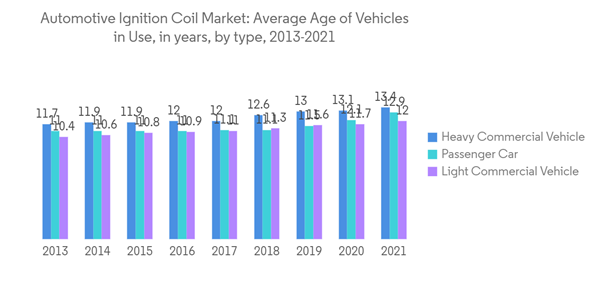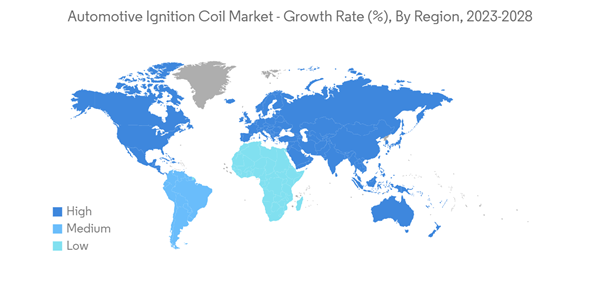Key Highlights
- The outbreak of COVID-19 caused several vehicle and component manufacturing facilities to shut down temporarily. However, with the gradual removal of lockdowns in several countries, the demand for vehicles slightly increased. The impact was evident in the auto industry as many companies faced disturbances with their production activities and supply chain.
- However, with the pandemic subsiding in the latter half of 2021 and early 2022, the industry has been crawling back up to pre-pandemic conditions, further aided by the exponentially growing electrification of the automotive industry. Despite the growth, electrification is a clear sign of a potential market demand slowdown for the ignition coils and can reduce market value in the coming years.
- The rise in the sales of automobiles globally and an increase in vehicle production positively affect the sales of automotive ignition coils. Even though the recent economic conditions have remained unstable, the global automotive industry has witnessed satisfactory growth. This is especially true in emerging economies, where automotive production is expected to be significant compared to developed economies. Rising urbanization, per capita income growth, and a rise in the living standards in these emerging economies also play a crucial role in market growth.
- The growing automotive demand worldwide is expected to increase the demand for ignition systems. However, at present, vehicle demand is increasing at a slow growth rate due to various reasons. The prime factor affecting vehicle sales and production in every country is the US-China trade war, owing to which the ignition system is likely to witness a slow growth rate in the near future.
- The increase in the average life of vehicles has accelerated maintenance and repair activities, including replacing their ignition coils. As the number of miles traveled increases, the replacement of ignition coils increases, which further boosts the demand for the automotive ignition coil market in the aftermarket segment.
- Another factor is the per capita income, which varies from country to country, and may influence the average age of vehicles. Despite the United States, China, India, and some European countries, like France, and Germany, observing high per capita incomes, the average age of vehicles has been increasing and was approximated to 10 years for passenger cars and 11-14 years for commercial vehicles.
Automotive Ignition Coil Market Trends
Growing Demand for Electric Vehicles Hindering the Automotive Gear Market Growth
- The need to attain sustainable transportation plays a significant role in driving the demand for electric vehicles. The electric vehicle (EV) market is becoming an integral part of the automotive industry and represents a pathway toward achieving energy efficiency and reduced emissions of pollutants and other greenhouse gasses.
- The rising number of environmental concerns and favorable government initiatives are some of the major factors driving the growth of the electric vehicle market. The increasing energy costs and competition among emerging energy-efficient technologies are also expected to fuel market growth.
- The rise in electric vehicles is still majorly driven by the policy environment. The 10 leading countries in electric vehicle adoption (China, the United States, Norway, Germany, Japan, the United Kingdom, France, Sweden, Canada, and the Netherlands) all have a range of policies to promote the uptake of electric vehicles.
- There has been a significant increase in the number of new electric vehicles registered every year around the world. The upsurge in demand was due to the combination of new and attractive models, incentive boosts by governments' green recovery funds, the 95g CO2 mandate, improved availability, and the extensive promotion of EVs.
- According to EV Volumes, the year-on-year growth rate of Plug-In-Hybrid Electric Vehicles has been on an increasing trend, with China witnessing a huge 82% growth between the years 2021 and 2022. Similarly, North America witnessed a growth rate of 48% (Y-o-Y), with Europe registering a 15% Y-o-Y growth rate between 2021 and 2022.
- The global and regional manufacturers of electric vehicles are innovating with new technologies, expanding their services across the world. For instance:
- China's BYD has a large production network in Europe that has largely gone unnoticed since 2021 in the passenger car world. Some of the primary reasons for this are the firm's new plant in Hungary, which is scheduled to begin construction in the latter half of 2023, its planned plant in France, and its joint venture operations in the United Kingdom, manufacturing electric buses.
- In December 2021, Daimler teamed up with the Chinese government to promote e-mobility in China. Electric mobility is one of the major pillars of Daimler's future mobility strategy. The company is bringing this strategy forward globally, especially in China, the world's largest NEV market.
- As ignition coils are not used in electric cars, the factors mentioned above are expected to put a significant challenge to the growth of the global automotive ignition coil market over the forecast period.
Asia-Pacific Leading the Ignition Coil Market
- Asia-Pacific is expected to dominate the automotive ignition coil market, owing to the growing vehicle demand in countries such as India, China, and ASEAN countries and increasing demand for commercial vehicles, due to the rise in construction, e-commerce, and mining activities (resulting in a rise in the logistics industry). Europe and North America, respectively, follow the Asia-Pacific region.
- The sales of vehicles are declining in major automotive markets such as China, Japan, and India, further impacting the growth of the automotive ignition coil market. The governments of growing economies are taking various steps to increase vehicle sales in their respective countries.
- For instance, China registered a total of 1.3 million units of plug-in electric vehicle sales in 2020, followed by South Korea, witnessing a total sales of 520,000 units of plug-in hybrid electric vehicle sales. Despite the high market for electric vehicles, the significant opportunity lies in the huge plug-in hybrid electric vehicle sales, which still require the vehicles to use ignition coils, thereby driving a major market growth across the Asia-Pacific region.
- Most luxurious vehicles are equipped with multiple vehicle ignition coils due to their high power and excellent performance. A significant increase has been witnessed in the sales of luxury vehicles in developing regions. For example, China has grown to become a major destination for the sales of luxury vehicles.
- Almost one-third of luxury vehicles are sold in China in terms of value. India is one of the world's largest vehicle ignition coil markets in terms of volume, with luxury cars generating high demand for vehicle ignition coils. However, vehicle manufacturers, both luxury and non-luxury segments, foresee a high potential for sales growth in the country and seek to invest further in this fast-growing market.
Automotive Ignition Coil Industry Overview
The automotive ignition coil market is dominated by a few players, such as Hitachi Automotive Systems, Continental AG, and Diamond Electric Mfg. Co. Ltd, Denso Corp., Mitsubishi Electric Corp., and BorgWarner. The companies are launching more technologically advanced ignition coils and expanding their geographical presence to be ahead of the competition. For instance:In September 2021, Hitachi Astemo announced that it would invest a total of USD 56 million to improve the industrial safety and production capacities of its production plants that manufacture various automotive parts, including ignition coils.
In March 2021, Diamond Electric Mfg. Co. Ltd announced that it would build a new plant in West Virginia, USA, to manufacture ignition coils for automobiles. The production capacity of ignition coils in the United States will be increased by 20%. The new US plant has a building area of 12,263 square meters. In addition to Ford's existing North American production bases, the main supply destinations are the North American production bases of Japanese automobile manufacturers.
Additional Benefits:
- The market estimate (ME) sheet in Excel format
- 3 months of analyst support
This product will be delivered within 2 business days.
Table of Contents
Companies Mentioned (Partial List)
A selection of companies mentioned in this report includes, but is not limited to:
- NGK SPARK PLUG Co. Ltd
- Denso Corporation
- Robert Bosch GmbH
- Hitachi Ltd
- HELLA GmbH & Co. KGaA
- Diamond Electric Holdings Co. Ltd
- Taiwan Ignition System Co. Ltd
- BorgWarner Inc.
- Eldor Corporation
- Furuhashi Auto Electric Parts Co. Ltd










